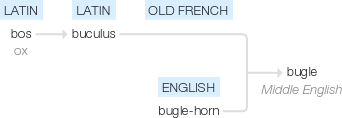Bugle
Middle English: via Old French from Latin buculus, diminutive of bos ‘ox’. The early English sense was ‘wild ox’, hence the compound bugle-horn, denoting the horn of an ox used to give signals, originally in hunting.
wiktionary
From Middle English bugle, from Anglo-Norman and Old French bugle, from Latin buculus(“young bull; ox; steer”).
From Late Latin bugulus(“a woman's ornament”).
From Middle English bugle(“bugleweed”), from Anglo-Norman and Old French bugle, from Medieval Latin bugilla, probably related to Late Latin bugillo.
etymonline
bugle (n.1)
"brass musical instrument," mid-14c., abbreviation of buglehorn "musical horn, hunting horn" (c. 1300), from Old French bugle "(musical) horn," also "wild ox, buffalo," from Latin buculus "heifer, young ox," diminutive of bos "ox, cow" (from PIE root *gwou- "ox, bull, cow"). Middle English also had the word in the "buffalo" sense and it survived in dialect with meaning "young bull." Modern French bugle is a 19c. borrowing from English.
bugle (v.)
"sound a bugle," 1852, from bugle (n.). Related: Bugled; bugling (1847). Also compare bugler.
bugle (n.2)
"glass bead used to ornament dress," 1570s, of unknown origin.
